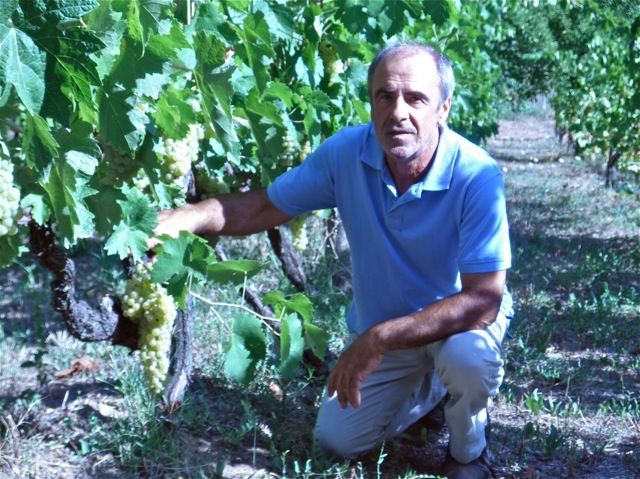An Evening with Carlo Noro
Last week’s dinner organized by Slow Food here in Rome was among the best meals we have ever eaten anywhere. Both Carlo Noro’s remarks about biodynamic agriculture and his fresh produce, which was the basis of the evening’s menu, were expected by us to be wonderful. Again and again, Carlo said it was the earth that made the flavors — a basic premise in biodynamic agriculture (you are what you eat and what you eat is what it has “eaten”). However, we had no expectation that the conception of the evening’s dishes, all prepared to the highest standard, would be so superb. The flavors were intense; each bite first coming together in the mouth so subtly, then expanding and then diminishing like chords played on a piano. There was not a wrong note in any of the dishes. They were imaginative but did not show off, combine ill-matched ingredients just to be different or claim to “re-invent” a traditional dish. The presentation was simple, appropriate to each dish but always beautiful to the eye. Adding to the pleasure and joy of the evening were our congenial and enthusiastic fellow diners, including Carlo and his lovely wife.
The meal began with a single small caramelized onion followed in short succession by one crispy leaf of chard and then a cold tomato soup made from Carlo’s very ripe fresh tomatoes. Next served were ravioli, filled with a puree of spring peas, in a light and delicate sauce with fresh, whole spring peas that were slightly al dente. This in turn was followed by a zucchini parmigiana that allowed the flavorful julienned zucchini to be primary even as all the ingredients were well balanced and integrated. The meal concluded with a strawberry sorbet made from Carlo’s sweet, intensely perfumed strawberries. The lacy meringue cookie with which it was served melted in our mouths.
There is an inverse correlation between how much I like a particular dish and how quickly I eat it; and, Marjorie said that she has never seen me eat as slowly as I ate each of these courses. This truly was “among the best meals we have ever eaten anywhere.” While the courses were many, none were large and we finished the evening feeling well satisfied, not over fed. Carlo, the chefs and the entire staff of the excellent Osteria di Monteverde are to be highly praised.
Indeed, only a true partnership between the farmer and the chef could produce such an exceptional meal. This caused Marjorie and me to muse about why food critics in the press seem mainly to write about local restaurants and occasionally gourmet markets but rarely, if at all, about the farmer. Why not evaluate the quality of the produce grown by specific local farmers? Perhaps if the press and other popular media were to elevate the farmer to the same exalted status as the chef (imagine a celebrated farmer), more of us would realize that the most healthful food is the most delicious and is not a sacrifice or a punishment. Good food is central to our existence and is to be appreciated and celebrated in the same way that we appreciate and enjoy good air and pure water.
The amount of time spent in the kitchen and at the table is diminishing significantly (and this in Italy, too). Concurrently, it seems that some of the best-selling cookbooks being published today, with their beautiful full-page photographs and travel-writing-style text, are meant for the coffee table rather than the kitchen counter. Indeed, too often the recipes in those cookbooks seem more incidental than central; their layout aesthetically pleasing but impractical to read while cooking and badly edited, containing inconsistencies or lapses in the directions, all of which is discouraging if you really want to cook. This passivity when it comes to food (and other aspects of our lives) is not, we think, a good thing. Perhaps, having a celebrated farmer will induce more of us to notice the raw ingredients of what we eat and even search out the best local farmers and buy directly from them. And if one has a kitchen full of fresh vegetables, one has no other choice but to cook with them—thereby rediscovering the joy of cooking.
Most appropriately, the evening ended with all of us departing the restaurant with a wooden crate or two of Carlo’s vegetables — peas and zucchini, tomatoes, beet greens, salad, fresh onions — which had been in the field just that morning.

